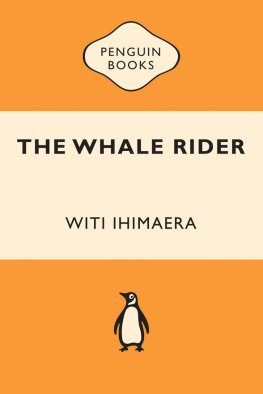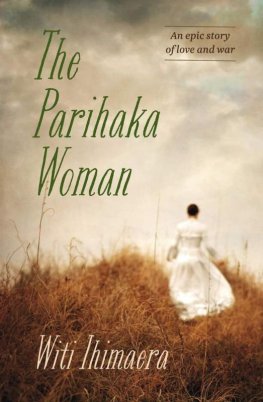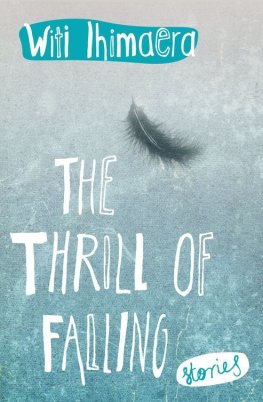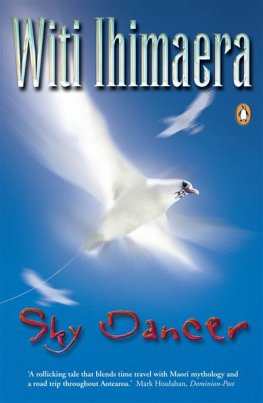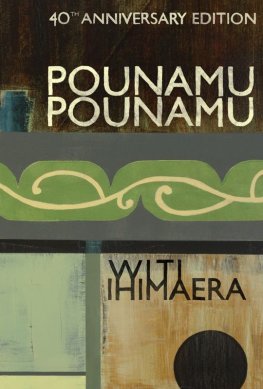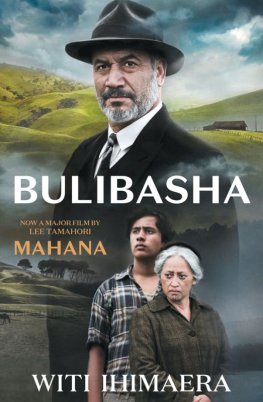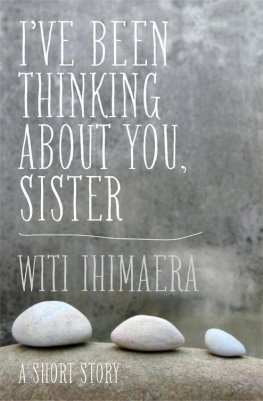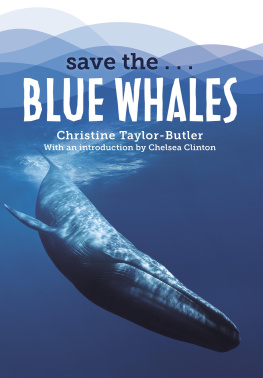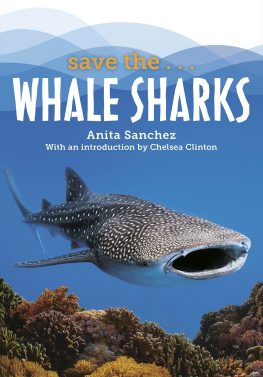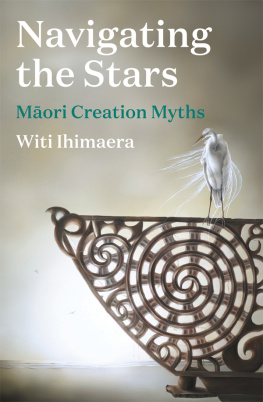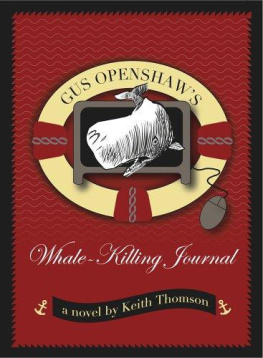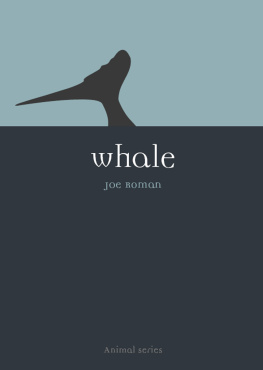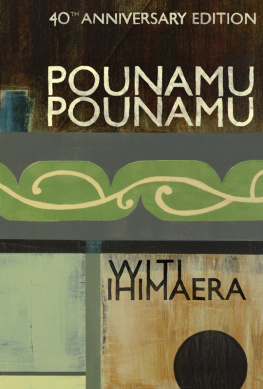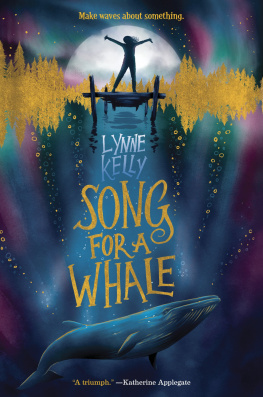The Whale Rider
by
Witi Ihimaera
For Jessica Kiri and Olivia Ata, the best girls in the whole wide world
This story is set in Whangara, on the East Coast of New Zealand, where Paikea is the tipuna ancestor. However, the story, people and events described are entirely fictional and have not been based on any people in Whangara.
He tohu aroha ki a Whangara me nga uri o Paikea.
Thanks also to Julia Keelan, Caroline Haapu and Hekia Parata for their advice and assistance.
Prologue

the coming of kahutia te rangi
One

In the old days, in the years that have gone before us, the land and sea felt a great emptiness, a yearning. The mountains were like a stairway to heaven, and the lush green rainforest was a rippling cloak of many colours. The sky was iridescent, swirling with the patterns of wind and clouds; sometimes it reflected the prisms of rainbow or southern aurora. The sea was ever-changing, shimmering and seamless to the sky. This was the well at the bottom of the world and when you looked into it you felt you could see to the end of forever.
This is not to say that the land and sea were without life, without vivacity. The tuatara, the ancient lizard with its third eye, was sentinel here, unblinking in the hot sun, watching and waiting to the east. The moa browsed in giant wingless herds across the southern island. Within the warm stomach of the rainforests, kiwi, weka and the other birds foraged for huhu and similar succulent insects. The forests were loud with the clatter of tree bark, chatter of cicada and murmur of fish-laden streams. Sometimes the forest grew suddenly quiet and in wet bush could be heard the filigree of fairy laughter like a sparkling glissando.
The sea, too, teemed with fish but they also seemed to be waiting. They swam in brilliant shoals, like rains of glittering dust, throughout the greenstone depths hapuku, manga, kahawai, tamure, moki and warehou herded by shark or mango ururoa. Sometimes from far off a white shape would be seen flying through the sea but it would only be the serene flight of the tarawhai, the stingray with the spike on its tail.
Waiting. Waiting for the seeding. Waiting for the gifting. Waiting for the blessing to come.
Suddenly, looking up at the surface, the fish began to see the dark bellies of the canoes from the east. The first of the Ancients were coming, journeying from their island kingdom beyond the horizon. Then, after a period, canoes were seen to be returning to the east, making long cracks on the surface sheen. The land and the sea sighed with gladness:
We have been found.
The news is being taken back to the place of the Ancients.
Our blessing will come soon.
In that waiting time, earth and sea began to feel the sharp pangs of need, for an end to the yearning. The forests sent sweet perfumes upon the eastern winds and garlands of pohutukawa upon the eastern tides. The sea flashed continuously with flying fish, leaping high to look beyond the horizon and to be the first to announce the coming; in the shallows, the chameleon seahorses pranced at attention. The only reluctant ones were the fairy people who retreated with their silver laughter to caves in glistening waterfalls.
The sun rose and set, rose and set. Then one day, at its noon apex, the first sighting was made. A spume on the horizon. A dark shape rising from the greenstone depths of the ocean, awesome, leviathan, breaching through the surface and hurling itself skyward before falling seaward again. Under water the muted thunder boomed like a great door opening far away, and both sea and land trembled from the impact of that downward plunging.
Suddenly the sea was filled with awesome singing, a song with eternity in it, a song to the land:
You have called and I have come,
bearing the gift of the Gods.
The dark shape rising, rising again. A whale, gigantic. A sea monster. Just as it burst through the sea, a flying fish leaping high in its ecstasy saw water and air streaming like thunderous foam from that noble beast and knew, ah yes, that the time had come. For the sacred sign was on the monster, a swirling moko pattern imprinted on the forehead.
Then the flying fish saw that astride the head, as it broke skyward, was a man. He was wondrous to look upon, the whale rider. The water streamed away from him and he opened his mouth to gasp in the cold air. His eyes were shining with splendour. His body dazzled with diamond spray. Upon that beast he looked like a small tattooed figurine, dark brown, glistening and erect. He seemed, with all his strength, to be pulling the whale into the sky.
Rising, rising. And the man felt the power of the whale as it propelled itself from the sea. He saw far off the land long sought and now found, and he began to fling small spears seaward and landward on his magnificent journey toward the land.
Some of the spears in mid flight turned into pigeons which flew into the forests. Others on landing in the sea changed into eels. And the song in the sea drenched the air with ageless music and land and sea opened themselves to him, the gift long waited for: tangata, man. With great gladness and thanksgiving he, the man, cried out to the land.
Karanga mai, karanga mai, karanga mai.
But there was one spear, so it is told, the last, which, when the whale rider tried to throw it, refused to leave his hand. Try as he might, the spear would not fly.
So the whale rider uttered a prayer over the wooden spear, saying, Let this spear be planted in the years to come, for there are sufficient spear already implanted. Let this be the one to flower when the people are troubled and it is most needed.
And the spear then leapt from his hands with gladness and soared through the sky. It flew across a thousand years. When it hit the earth it did not change but waited for another hundred and fifty years to pass until it was needed.
The flukes of the whale stroked majestically at the sky.
Hui e, haumi e, taiki e.
Let it be done.
Spring

the force of destiny
Two

The Valdes Peninsula, Patagonia. Te Whiti Te Ra. The nursery, the cetacean crib. The giant whales had migrated four months earlier from their Antarctic feeding range to mate, calve and rear their young in two large, calm bays. Their leader, the ancient bull whale, together with the elderly female whales, fluted whalesongs of benign magnificence as they watched over the rest of the herd. In that glassy sea known as the Pathway of the Sun, and under the turning splendour of the stars, they waited until the newly born were strong enough for the long voyages ahead.
Watching, the ancient bull whale was swept up in memories of his own birthing. His mother had been savaged by sharks three months later; crying over her in the shallows of Hawaiki, he had been succoured by the golden human who became his master. The human had heard the young whales distress and had come into the sea, playing a flute. The sound was plangent and sad as he tried to communicate his oneness with the young whales mourning. Quite without the musician knowing it, the melodic patterns of the flutes phrases imitated the whalesong of comfort. The young whale drew nearer to the human, who cradled him and pressed noses with the orphan in greeting. When the herd travelled onward, the young whale remained and grew under the tutelage of his master.

